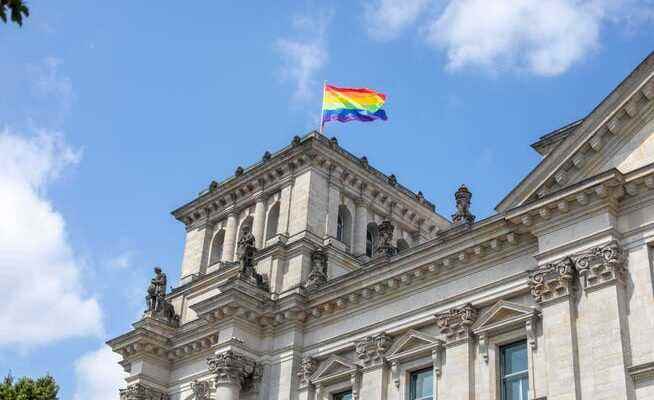Germany’s national colors of black, red and gold have always been a symbol of the liberal republic. But they are not “diverse” enough for today’s parliamentarians. A lesson in misunderstood tolerance.
At the weekend, the rainbow flag waved from the German Bundestag for the first time.

Marc Felix Serrao, Editor-in-Chief of the NZZ in Germany
You are reading an excerpt from the weekday newsletter “The Other View”, today by Marc Felix Serrao, Editor-in-Chief of the NZZ in Germany. Subscribe to the newsletter for free. Not resident in Germany? Benefit here.
When it comes to standing up for “diversity”, many German politicians know no stopping. It was the same at the weekend when, for the first time in the history of the German Bundestag, the rainbow flag, in addition to the national and European flags, also waved in the wind, once in front of and once on top of Parliament. The occasion was this year’s Christopher Street Day, CSD for short.
Diversity, This is how Parliament President Bärbel Bas explained it in a video message, make the country more livable. The Social Democrat on the Bundestag Presidium was and is not alone with this view. The CDU politician Yvonne Magwas also voted for the rainbow there as a representative of the bourgeois opposition. When she was criticized by a Christian Democratic entrepreneur, she found it “inhuman”.
Who wants to be “inhuman”?
This tone is probably one of the reasons why the change of flag did not trigger any significant discussion. Who wants to be told that they are inhuman or homophobic. Such accusations come up more quickly in political debates today than they used to, and in Germany they come up particularly quickly.
This also applies to the accusation of being close to the AfD, which is often raised when a consensus is questioned that the far-right party, for whatever reason, also rejects. For the AfD, the rainbow flag is simply a “propaganda flag”.
This is of course nonsense. The flag of gays and lesbians, transsexuals, intersexuals and bisexuals is reminiscent of a struggle for emancipation that is far from over. Also in Germany. Even in the oh so tolerant Berlin there are on average two attacks a day; mostly gay men are the victims.
It is good and right if the Bundestag also declares its solidarity with the sexual minorities in the country. But changing the flag is the wrong method: not because the rainbow flag is just a “little flag” or because sexual minorities are already receiving enough support, as the Christian-Democratic businessman believes (who is therefore of course not “inhuman”). The rainbow over Parliament is wrong because it expresses disdain for the actual flag, which it does not deserve.
Black-Red-Gold stands for the most liberal country Germany has ever been. It stood for the republican movement in the 19th century, was opposed by the Nazis in the 20th century and is scorned by their nationalist revenants this century. It stands for a basic law that puts human dignity first and declares it inviolable. It is, in short, the best that this country has produced in terms of national symbols. But unfortunately it’s not good enough for today’s top politicians.
Even more modern, even more diverse
“We are a modern and diverse country,” said Home Secretary Nancy Faeser when she approval for the change of flag granted. It is “high time that we show this more clearly as state institutions”. In other words: black, red and gold does not show the modernity and diversity of the Federal Republic clearly enough.
Anyone who means well with the minister can see a special democratic zeal in her words. But then it would be incomprehensible why she only wants to fly the rainbow flag on special occasions like the CSD and not 365 days a year. After all, in Faeser’s opinion, this represents even more the values that are important to her than black, red and gold.
The federal flag has constitutional status and remains the “most important state symbol,” according to the minister’s statement. The rainbow should therefore remain the occasion-related exception.
But what about other occasions: International Women’s Day, for example, or Holocaust Remembrance Day? Are they less important than the CSD? Wouldn’t there be any flags that Germany could hoist on these days?
A parliament that declares the most important state symbol to be insufficient on two days a year (the CSD and the International Day Against Homophobia, Biphobia, Interphobia and Transphobia) has to put up with the question on many other days why it is different should be. Let alone why it still sticks to the old black, red and gold.
